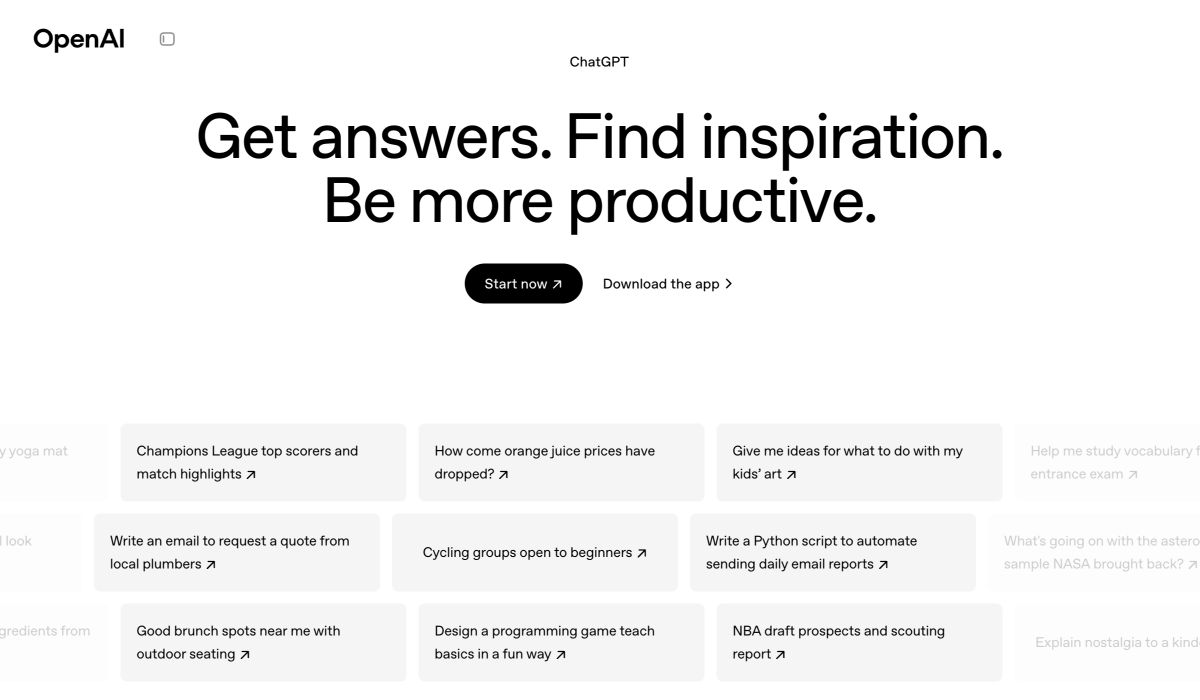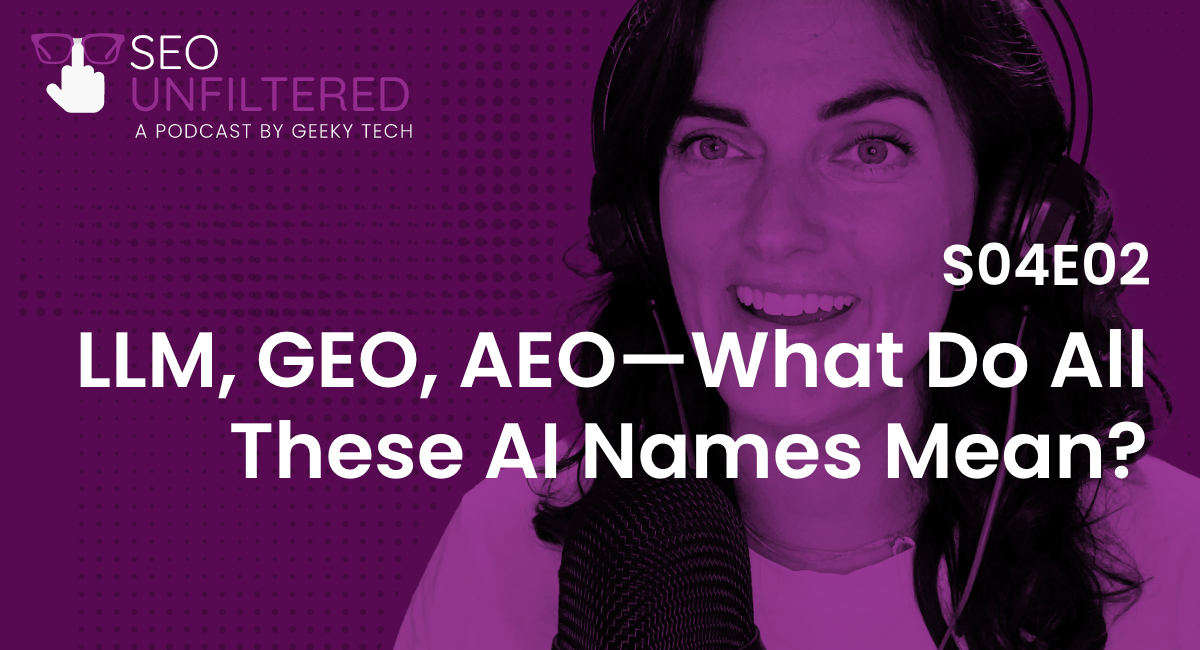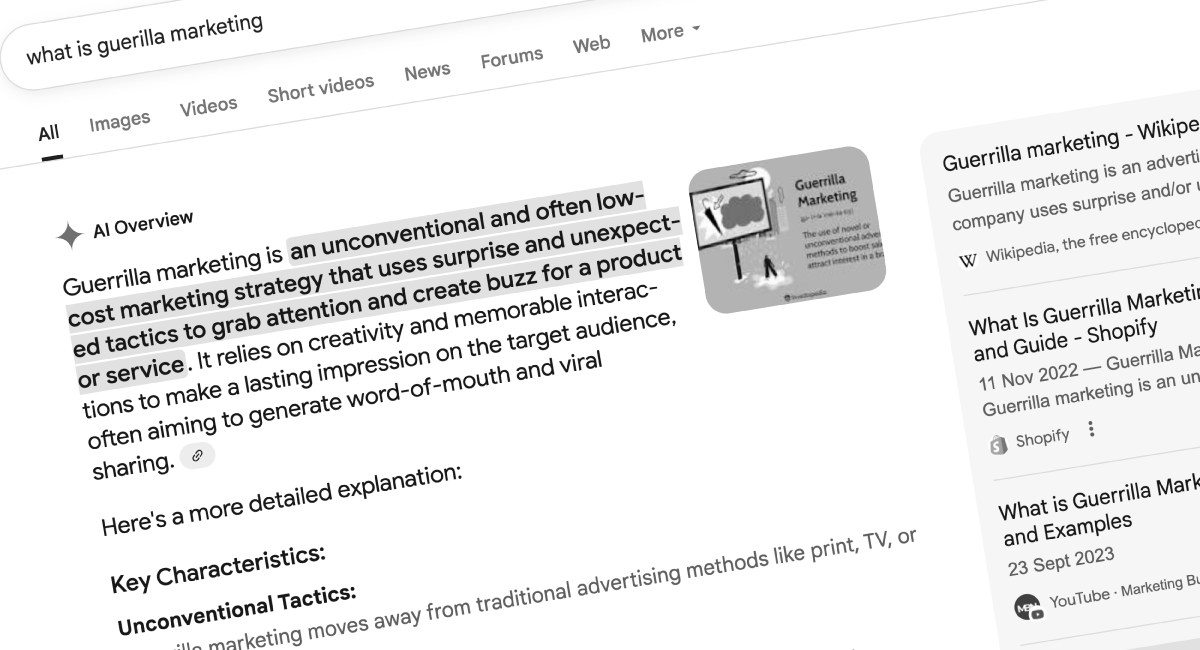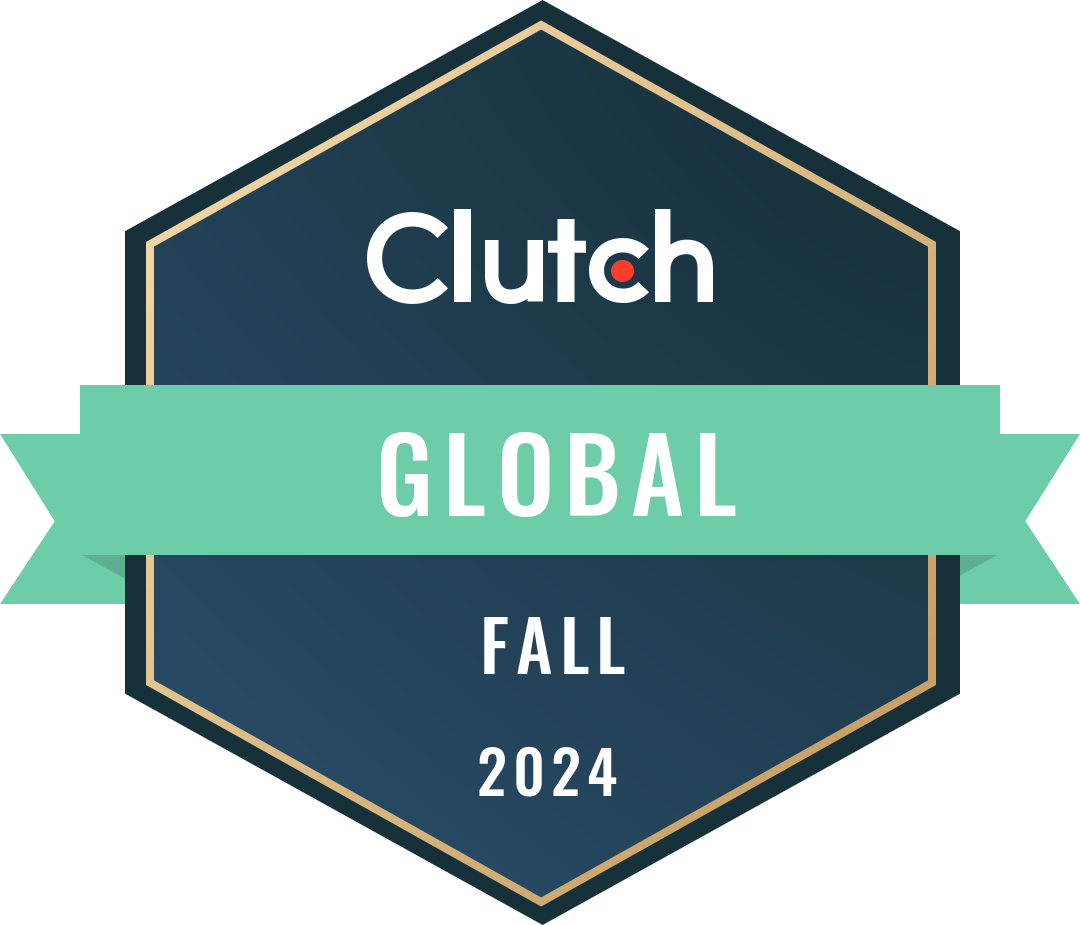AI Search Engine Optimisation: How AI Is Reshaping SEO
Quick summary: This article is about AI Search Engine Optimization (AI SEO) and how AI is changing SEO. It discusses the strategies businesses can use to integrate AI with SEO to stay competitive in an evolving digital landscape, and covers key AI tools and techniques that enhance both SEO and GEO.
Anyone who has a vested interest in SEO is probably trying not to think about all the ways in which AI is undermining their current search engine optimization strategies right now. After all, we’ve seen this kind of thing happen before, right? Video killed the radio star. Streaming killed the silver screen star.
But did AI really kill the SEO star? If this is what’s keeping you up at night, stop fretting — SEO isn’t going anywhere.
But it is changing.
In order to prepare ourselves for the impact of AI on search trends, we first need to understand how it is altering traditional search and which effective strategies you can adopt to future-proof your digital marketing.
Terms You Should Know Right Off the Bat
As we ride this current wave of AI-powered search technology, we need to make sure that everyone reading this understands what the newly minted AI-related terms mean.
Traditional SEO
Search engine optimization is a series of practices designed to increase a website’s visibility on traditional search engines like Google, Bing, Yahoo! and all the other little guys. The core strategies of traditional SEO efforts include keywords, technical optimization, and off-page SEO (such as backlinks).
Generative AI
Also known as GenAI, this type of artificial intelligence is trained on vast amounts of data to understand patterns and create new content (whether it’s text, video, audio, or code) from user prompts.
LLM
Short for large language model, an LLM is a type of generative AI that learns from huge text data to understand and predict languages and to generate new text in human-sounding language, enabling people and AI systems to ostensibly talk to each other.
GEO
Otherwise known as generative engine optimization, GEO is a series of techniques designed to improve content for AI-powered search engines like Perplexity, Claude, ChatGPT, etc. While it shares many techniques with SEO, it particularly focuses on user intent, structured data, and conversational or question-based content.

AI SEO
AI SEO is a term that can mean different things to different people. The prevailing definition is that it is a set of AI-powered search engine optimization tools designed to bolster your SEO efforts; however, many people use the term ‘AI SEO’ to mean AI’s complete takeover of SEO functions. Others use the term as just another way of saying GEO.
Just by reading these definitions, it’s clear that AI and SEO have become intrinsically linked.

The Impact of AI on SEO
For some reason, the whole ‘SEO is dead’ fear-mongering never really seems to go away. There’s always a new Satanic Panic around the corner, and you can be sure that AI is the SEO apocalypse du jour.
And yet, SEO is still alive and kicking.
But…
Having said that, it’s safe to say that AI is affecting the way people search the web. As Search Engine Land points out, ‘search isn’t a platform, it’s a behaviour.’ It’s not dying, but the fact that people are using different ways to find information online means that search has become divided territory.
For example, GenAI has made it so that we no longer have to click through different links to find the information we’re looking for—and that’s as true for Perplexity as it is for Google. For example, Google’s AI Overviews feature has led to an increase in zero-click searches, or searches where the user does not scroll down and click on a link because the question is answered on the search result page (this also includes Featured Snippets).
As of March 2025, keywords with mostly informational intent led to 43.11% zero-click queries. However, it’s not as cut and dry as ‘AI Overviews is stealing my visibility.’ The relationship between the type of search, the user intent, and the answer itself is far more complex.
But anyway, we digress a little.
What we all really want to know is: what exactly has AI’s impact on SEO been so far?
The numbers are telling us that while Google Search is still the Mac Daddy of delivering answers, tools like its own AI Overviews, as well as ChatGPT, Perplexity, Claude, Gemini, and Copilot have siphoned off a pretty sizable chunk of users.
But that does not spell the end of SEO. Considering the fact that all of these LLMs have web search capabilities, it actually makes a stronger case for doubling down on your SEO efforts.
The Relationship Between GEO and SEO
The reason AI isn’t the death knell of SEO is that both of them rely on the same techniques to improve page visibility. Technical optimization, high-quality content, and off-page authority are as important to Google algorithms as they are to AI systems.
Similarities Between GEO and SEO
Techniques | SEO | GEO |
Content Focus | Targeting keywords for search engine visibility | Creating optimized content that AI systems can pull to answer questions |
User Intent | Aligning content to match search intent | Aligning content to be used in AI-driven answers |
Optimization Approach | Focusing on keywords, backlinks, and technical SEO | Focusing on clarity, structure, and AI-query relevance |
Want to future-proof your website for AI-driven search engine optimization? Ask your SEO agency what they’re doing to integrate GEO into their traditional digital marketing services.

Effective AI-Search Engine Optimization Strategies
If you’re looking to optimize your pages for both LLM answers as well as search engine results, here are some ways to integrate AI optimization strategies into your current SEO:
Focus on E-E-A-T
E-E-A-T stands for experience, expertise, authoritativeness, and trustworthiness. There’s a lot of debate over whether or not E-E-A-T is an actual ranking factor, especially since Google claims that it doesn’t directly influence where content appears in search results.
But, as it is the standard that Google Search Quality Raters use to assess the caliber of a specific piece of content, we’d be silly not to use the same guideline.
And to be fair, it’s a logical approach.
As a user, wouldn’t you prefer to learn something from a well-made site that seems to have been looked after on a regular basis and written by an expert with real credentials whom other people in the industry often cite?
Or, if you’re buying a product online, wouldn’t you choose a website that doesn’t look like it’s not about to overcharge you or steal your personal info?
The internet’s been around for a while now. We may not realize it, but most of us have been trained to look for tell-tale signs of a site’s trustworthiness.
And, believe it or not, both search engines and AI systems are looking for the same thing too. Content that displays E-E-A-T is more likely to rank high in Google and be used in a web search during an LLM query.
If you haven’t been following these E-E-A-T best practices already, here’s some quick advice:
- Take pride in your work. Avoid silly spelling mistakes and errors in grammar and punctuation.
- Write well. High-quality content that’s comprehensive, deep, and accurate is far more likely to be cited in AI answers.
- Add credibility to your work by linking your content to an author bio that clearly demonstrates your knowledge of the subject, e.g., previous awards, publications, keynote speeches, etc.
- Get your brand name out there. Both AI and SEO measure a site’s authoritativeness by the quality (and some say quantity) of their backlinks, mentions, and referrals.
- Have a solid social presence online to demonstrate your industry involvement and expertise.
- Make sure your page URLs have the right security protocols, i.e., the ‘s’ in https://

Leverage AI for Keyword Research and Content Creation
Grab those AI-powered tools by the horns and get to work on keyword research and content creation. You’re probably already well aware of how many different ways AI tools can help streamline these essential GEO and SEO processes.
Not only do they allow you to discover user intent and identify keywords, long-tail keywords, and semantically related keywords faster, but they can also help you generate content that appeals to both people and AI/search engines.
Prioritize User Intent When Creating Your Content
If you want to bolster your pages for SEO and AI, focus on creating content with a clear user intent. Both the old and the new search modalities rely on content that directly addresses the specific needs and questions of users.
AI takes it a step further by being able to understand user intent in a contextually rich and nuanced way. For example, if you’re asking a question, it won’t just answer that one query — it might also anticipate what other related information could help further your understanding of it. This is another reason why writing in-depth content that holistically covers an entire topic is better for your visibility.
Focusing on user intent ensures that your content resonates with what people are truly searching for, which boosts your visibility in both AI-driven search and traditional search engines.
Don’t Stop SEOing
AI-driven search relies heavily on core SEO practices, so it’s more important than ever to look at how your company performs at keyword research, technical optimization, and off-page optimization.
- Keyword research: This helps you discover AI-related topics and long-tail keywords that jive with user intent to increase the likelihood that your content will be used in AI-generated responses, as well as search engines.
- Technical optimization: A technically sound website with fast loading times, mobile-friendliness, and proper structured data remains essential for both SEO and GEO. Search engines and AI systems alike need clear, well-optimized content to surface the best answers.
- Off-page optimization: High-quality backlinks, mentions, and referrals continue to be a strong ranking factor. LLMs lean on content authority and credibility, and these off-page signals boost your content’s chances of being selected by AI engines.
In other words, don’t stop optimizing—maintain your SEO practices while integrating GEO to ensure your content thrives in both traditional and AI-driven search results.

How to Use AI for Search Engine Optimization Workflows
Companies all over the world are somewhere on their digital transformation journeys, and AI is pretty much the coal making that train roll.
From a ranking perspective, AI tools are helping marketing teams accelerate and improve their SEO practices by providing the means to perform keyword research, speed up content production, collect and analyze data, and forecast search trends. Beyond that, it is also giving marketers more valuable insights than ever before.
Think of all the tools you’re using right now that are helping you perform your SEO tasks a lot faster:
- Keyword research tools like Semrush and Ahrefs offer in-depth insights and competitor analysis to help you identify the best terms to target.
- Technical optimization tools like Screaming Frog and Google PageSpeed Insights can perform site crawls and test page load times.
- Off-page optimization tools like Moz and Majestic offer helpful insights and analyses of your backlinks.
Risks and Mitigation Strategies When Using AI in SEO
They say you can have too much of a good thing, and this is as true with AI as it is with anything else. We’re all excited to jump on the AI bandwagon because of its ability to help us scale and fine-tune our marketing strategies, but ye be warned, thar be risks afoot!
Watch Your Over-Reliance on AI-Generated Content
We’ve seen with our own eyes how AI’s sweet-talkin’ promises of content volume and all the marketing potential that comes with it can seduce marketers into going full throttle on purely AI-written content. But when we look at what it tends to produce, we’re disappointed with (if not amused by) the results.
And what ends up happening? Most of it gets thrown in the trash.
If you’re going to use AI to create your content, a little human oversight can go a long way. AI can do many great things, but the longer the content piece, the more rope you give it to hang itself with.
You may get away with short bursts of AI content. But long-form blog posts, white papers, and how-tos? It might start losing points in the E-E-A-T department. Never publish content without giving it a thorough proofread and fact-check beforehand. That way, when you link it to your author byline, you can be sure that your credibility won’t be affected.
Apply Human Oversight to Prevent Algorithmic Penalties
Here we are talking about E-E-A-T again, but it’s one of those simple things that never fails to be true: People don’t want to read crap.
And when used irresponsibly, AI-written content can erode a reader’s trust in your brand, which simultaneously affects your rankings (and vice versa). Without proper human oversight and perhaps even common sense, both search engines and AI answer engines might label your content as spammy, potentially harmful, or at the very least, low quality.
The flip side of avoiding algorithmic penalties is aiming for maximum visibility, so if you and your team focus on SEO and GEO best practices, you should naturally avoid ranking issues altogether.
Avoid Using AI Just for the Sake of It
You know an upgrade isn’t necessary when it takes longer or causes more problems than its predecessor. These days, businesses on their digital transformation journeys are hungry for tools that are going to automate, simplify, and speed up their tasks—and there’s nothing wrong with this. In a data-driven world, businesses will need to lean more on AI to stay ahead of their competitors.
But does that mean that AI tools automatically deserve a seat at the marketing table? Before investing your money on the latest MarTech, first consider how it will fit within your SEO strategy. Define what you want your AI SEO tools to achieve, and make sure that aligns with your long-term goals before committing.
The Future of AI and Search Optimization: Staying Ahead of the Curve
If you were to imagine AI technology on a timeline, we’ve really only taken a few steps forward. Patience, curiosity, and flexibility will be key virtues as AI continues its growing impact on SEO.
In the meantime, your ongoing success with SEO depends on staying adaptive, creating real value, and monitoring the generative AI landscape.








